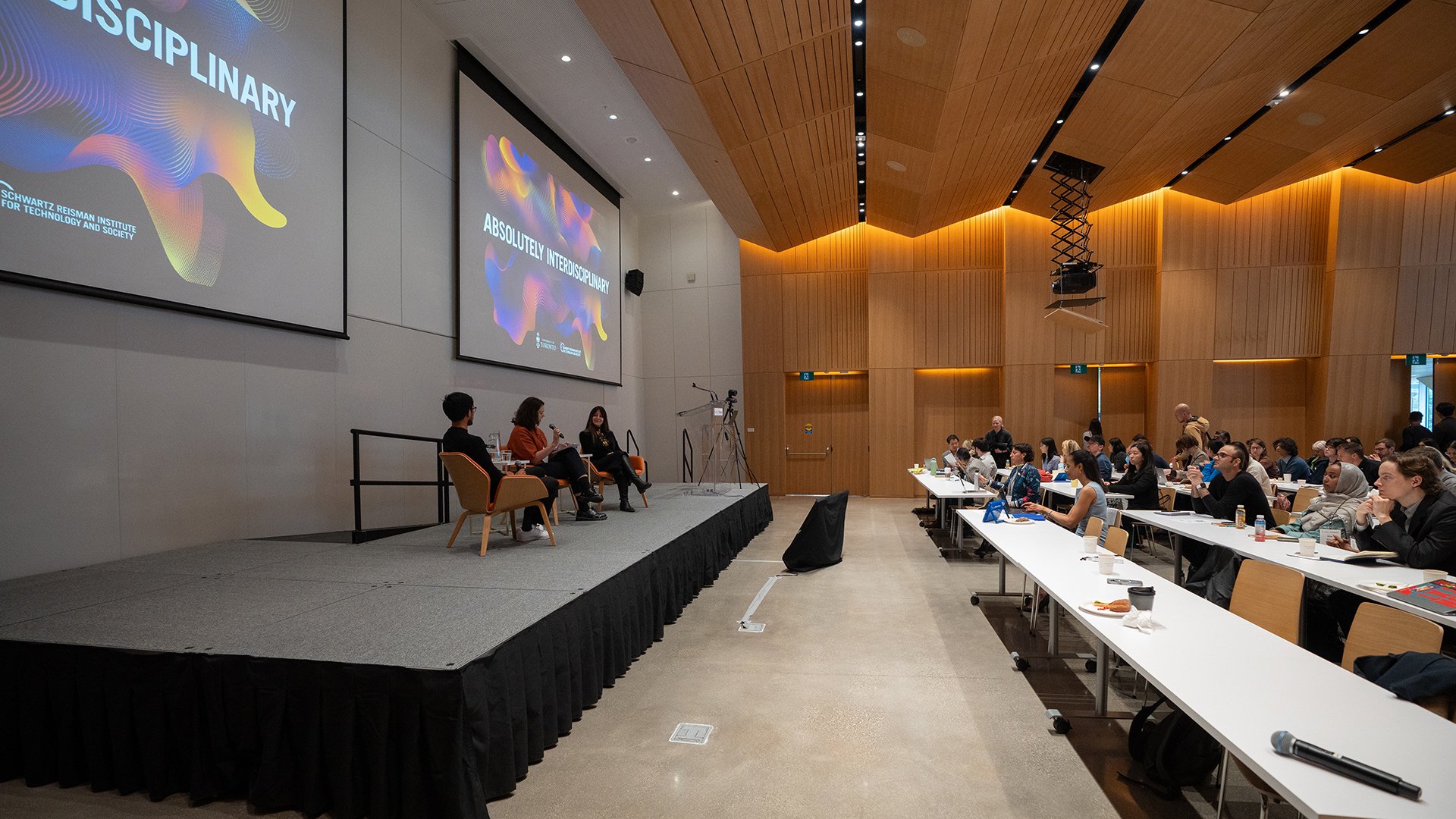WHAT’S HAPPENING
Here’s what we’re thinking about, talking about, and working on at the Schwartz Reisman Institute.
Therapy bots: Regulating the future of AI-enabled mental health support
AI therapy chatbots promise accessible mental health support—but without proper oversight, they risk misleading users and causing harm. The Schwartz Reisman Institute’s new policy brief outlines how Canada can regulate these tools to protect public trust and ensure AI innovation truly serves human wellbeing.
AI companions: Regulating the next wave of digital harms
From AI chatbots marketed as digital partners to voice assistants designed for intimacy, these systems promise connection while raising urgent questions about privacy, manipulation, and digital addiction.
Absolutely Interdisciplinary 2025 explores new frontiers in AI research
At SRI’s annual conference, participants discussed future directions and key challenges in AI research, including the complexities of aligning advanced AI with human values and interdisciplinary perspectives on AI safety.
Can a market-based regulatory framework help govern AI? New report weighs in
In April 2024, the Schwartz Reisman Institute for Technology and Society (SRI) hosted a workshop that brought together 33 high-level experts to explore the viability of regulatory markets. Over the course of the workshop, participants identified key challenges and worked through practical steps to move from theory to operationalization, laying the groundwork for a clear roadmap toward future governance. Their findings are captured in a new report (PDF) published today by SRI.
Are humans becoming obsolete? David Duvenaud on AI’s growing dominance
SRI Chair David Duvenaud’s op-ed in The Guardian explores the impact of AI on human relevance and suggests strategies for adapting to ensure we aren't outpaced in every area of society.
SRI graduate fellows explore the evolution of genomic language models
Can AI unlock the hidden rules of our DNA and revolutionize medicine? SRI Graduate Fellows Micaela Elisa Consens and Ben Li explore this question in a new commentary examining the potential of genomic language models to transform biomedical research.
Absolutely Interdisciplinary returns to explore new frontiers in AI research
The Schwartz Reisman Institute’s annual academic conference Absolutely Interdisciplinary returns for 2025 to explore interdisciplinary approaches to AI governance, risk and safety.
Unequal outcomes: Tackling bias in clinical AI models
A new study by SRI Graduate Affiliate Michael Colacci sheds light on the frequency of biased outcomes when machine learning algorithms are used in healthcare contexts, advocating for more comprehensive and standardized approaches to evaluating bias in clinical AI.
Roger Grosse and Marzyeh Ghassemi awarded AI2050 fellowships to advance research on beneficial AI
Schmidt Sciences has named SRI Chair Roger Grosse and Faculty Affiliate Marzyeh Ghassemi to its 2024 cohort of AI2050 Fellows. The program funds senior researchers and early career scholars to address a wide range of global challenges in AI.
Innovating care: Exploring the role of AI in Ontario’s health sector
What opportunities and challenges are there for the use of AI in healthcare? At a recent SRI workshop, experts explored how AI is transforming Ontario's healthcare sector, highlighting its potential to improve care and exploring pressing challenges around patient involvement, health equity, and trustworthy implementation.
Making big leaps with small models: What are small language models and super tiny language models?
The size of language models significantly impacts their adoption and usage. SRI Policy researcher Jamie A. Sandhu explores how small models are making big impacts in the field of AI.
From mourning to machine: Griefbots, human dignity, and AI regulation
Griefbots are artificial intelligence programs designed to mimic deceased individuals by using their digital footprint. Griefbots raise significant concerns about data collection and implications to human dignity. This article explores the digital afterlife industry and the ethical and legal challenges it presents, including a consideration of health, privacy, and property laws in Canada.












